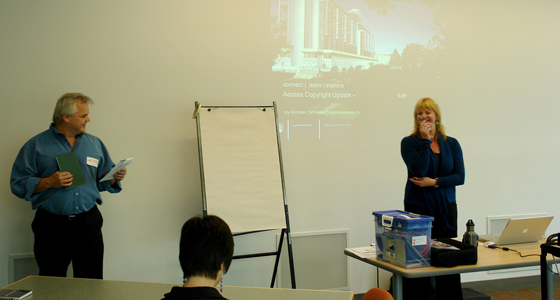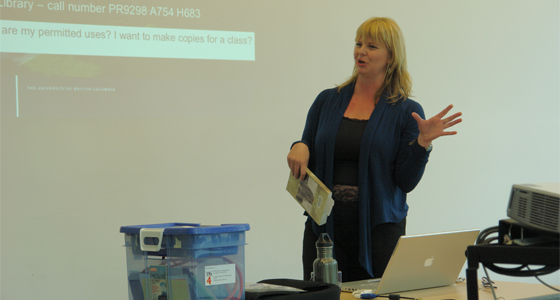 Have you, or any of your colleagues, ever sought permission before copying a published article or chapter to share in class? Do you know the difference between authorized use of a print resource versus an electronic resource, or an openly available web resource?
Have you, or any of your colleagues, ever sought permission before copying a published article or chapter to share in class? Do you know the difference between authorized use of a print resource versus an electronic resource, or an openly available web resource?
The 2011 CTLT Institute opened its week-long series of sessions with a discussion on copyright. In this session, Joy Kirchner discussed appropriate use of copyrighted material for teaching and learning, explained the Access Copyright license, Fair Dealing, and participants’ rights as an author.
Joy is the Scholarly Communications Coordinator at the UBC Library. Her role involves identifying recommended and sustainable service models to support scholarly communication activities on the campus. She is the point person for open access, copyright and author rights queries on campus and she is responsible for formalized discussion and education of these issues with faculty, research and publishing constituencies on the UBC campus. In past positions, Joy negotiated licenses for UBC’s access to online material such as ejournals and ebooks.
Joy ensured that participants were fully aware of the principles of copyright at the outset. As a test, she asked participants to stand if they own the copyright to anything they have produced. Only a few of the participants rose to their feet, prompting Joy to ask the seated audience members if they had ever written a guide, a report, or even a webpage (which are indeed covered under Canadian copyright law). She clarified, “As long as it’s in a fixed, tangible medium, we [automatically] own copyright to it unless you sign it away in writing such as in a publisher agreement.” The Copyright Act prevents anyone from reproducing copyright materials without the owner’s permission. She explained that while the Fair Dealing provision allows a copyright exception for “private study or research,” Fair Dealing does not apply to the distribution of copies for print materials in the classroom. This means that instructors have to request permission from the copyright owner for each work they intend to copy for classroom use (unless they hold copyright for that work). Access Copyright helps with this situation.
She explained that UBC has held an agreement with Access Copyright, a copyright collective that “grants pre-authorized clearance to use millions of [print] works” in the classroom. With the Access Copyright licensing, UBC instructors have been able to enjoy pre-authorized clearance to copy a large list of print works covered under the blanket license without having to seek permission. Although the coverage has a list of excluded works, instructors are able to copy most print works to a certain extent (typically, copying ten percent of a document for the classroom is permitted).
 However, this may change at some universities, including UBC. UBC, along with other institutions across Canada, has been having discussions about the implications of opting out of Access Copyright in light of proposed excessive fee increases to the tariff that Access Copyright charges to Canadian universities. Although the current interim agreement still entitles UBC instructors to the same print copying privileges as under the previous license, a future decision to opt-out would mean that instructors will have to change their copying practices.
However, this may change at some universities, including UBC. UBC, along with other institutions across Canada, has been having discussions about the implications of opting out of Access Copyright in light of proposed excessive fee increases to the tariff that Access Copyright charges to Canadian universities. Although the current interim agreement still entitles UBC instructors to the same print copying privileges as under the previous license, a future decision to opt-out would mean that instructors will have to change their copying practices.
For the rest of the workshop, Joy discussed additional ways for participants to share documents in the classroom. Her strategies included making use of the UBC Library’s large database of full-text, licensed electronic works, checking for public domain items, and using Creative Commons licenses to find Open Access materials. Regardless of the decision that awaits with Access Copyright, these strategies provide effective ways to respect copyright laws in the classroom.
According to Joy, Library patrons can look to UBC’s 5.4 million electronic resources, which are already licensed for typical educational uses, as alternatives to using printed documents. The Library is responsible for negotiating electronic licenses on behalf of the university, and most usual educational purposes (such as copying for the classroom) are covered in the license. For further clarity, the UBC Library has made permissible activities with its electronic materials very straightforward, with a large License Terms of Use site that clearly states specific permissions associated with each publication. When it comes to sharing the electronic materials, Joy explained that it is usually permissible to share works using Persistent URL’s, which route students through their Campus-Wide log-in to authenticate them as UBC affiliates before they can access the resources. However, posting scanned copies is typically not permitted, because it becomes difficult to restrict access to only UBC Community members.
Many audience members were curious about the copyright implications of sharing works from public Internet sites, such as YouTube, and the discussion addressed the particular challenges with copyright compliance today. Joy explained that, “we are dealing with an outdated copyright law in Canada” and as a result, permissible activities with online works are “open to interpretation.” In this uncertain climate, her advice is to seek permission from the copyright holder in any case of doubt. In addition, Joy is a strong proponent of Creative Commons licensed materials. These resources provide a clear indication of how a particular work can be used, reflected through a specific type of license. She says that many Creative Commons materials are Open Access, which promote the opening up and sharing of published works.
Going forward, Joy expects many changes to take place before the copyright situation at UBC becomes certain. Until then, Joy’s sound advice is simple: “If in doubt, ask permission, or ask a UBC Subject Librarian for help.”
For up-to-date information about the proposed Access Copyright tariff, please visit this website that the UBC Library has developed to provide the latest updates.


Joy Kirchner will be offering a session on:
Scholarly Rights & Responsibilities: Understanding Appropriate Use of Copyrighted Material
on August 24, from 2:30 to 4:00 pm
For more information and to register, please follow the link below:
http://events.ctlt.ubc.ca/events/view/1334
Judy